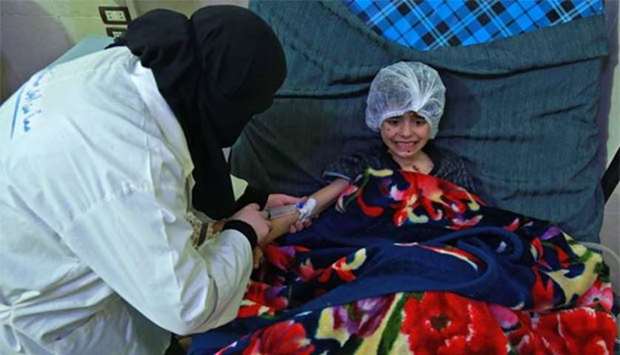Western powers turned up the heat on Damascus on Friday as tens of thousands of civilians in Syria's battered rebel enclave of Eastern Ghouta awaited desperately needed aid.
More than 600 civilians have been killed in the enclave outside Damascus since Russia-backed regime forces launched an assault on February 18.Eastern Ghouta's 400,000 residents have lived under regime siege since 2013, facing severe food and medicine shortages even before the latest offensive.
The United Nations Human Rights Council was to hold an emergency session later on Friday on the crisis, as dozens of aid trucks remained unable to enter the enclave.
Violence has been tempered since Russia began daily pauses in fighting Tuesday -- but a total ceasefire across Syria demanded by the UN has not come into effect.
The recent onslaught shocked the international community and has left medical staff in Eastern Ghouta struggling to cope with the wounded.
In a hospital in the main town of Douma this week, 18-month-old Hala cried in pain as a member of staff examined her bandaged left leg.
Without the necessary medical supplies to treat the infant, her leg will likely have to be amputated, explained a trainee doctor who gave his name as Mohammed.
"Her story is a shame on humanity," he said.
On Friday, the United States, Germany and France upped the pressure on Damascus as last weekend's UN Security Council vote for a ceasefire has failed to stop fighting.
US President Donald Trump and German Chancellor Angela Merkel agreed in a phone call that the Syrian regime must be held accountable.
"This applies both to the Assad regime's deployment of chemical weapons and for its attacks against civilians and the blockade of humanitarian support," a German chancellery statement said.
Trump and French President Emmanuel Macron, meanwhile, vowed there would be "no impunity" in the event of further chemical weapons use in Syria.
Washington has asked the UN Security Council to set up a new inquiry into chemical weapons attacks in Syria after reports of suspected chlorine use in Eastern Ghouta, according to a draft resolution obtained by AFP on Thursday.
The Syrian government has denied using chemical weapons and Russia has questioned UN findings that it carried out sarin and chlorine attacks.
It was unclear when the US proposal, or a separate Russian draft resolution, on the Syrian chemical inquiry would come to a vote.
On Friday, distrust ran high among civilians in Eastern Ghouta on the fourth day of a daily five-hour "humanitarian pause".
The pause announced by Russia has lessened but not halted the deadly bombing, which has ripped through homes and reduced residential areas to grey rubble.
Embattled Syrian civilians have not left the enclave, despite a Russian offer of safe passage out during the daily halt in fighting.
"People are still in their cellars because they don't feel safe," a 24-year-old who gave his name as Mohammed told AFP in the devastated town of Hammuriyeh.
Damascus and Moscow accuse the armed opposition of preventing civilians from leaving.
In the main town of Douma, 25-year-old Malik Mohammad told AFP the daily pause had not brought any peace of mind to civilians.
"During the pause, the bombing continues for five hours outside Douma and as soon as it ends, it starts up again inside."
Early Friday, before the 07:00 GMT start of the pause, warplanes pounded areas including Douma and the town of Zamalka, the Syrian Observatory for Human Rights said.
Rockets fell on Douma and Harasta during the pause, the Britain-based war monitor said, as regime forces advanced on the southern outskirts of the enclave.
People in Eastern Ghouta are surviving on what little food they have, sometimes relying on meagre meals of rice and bread from charities, an AFP correspondent said.
The price of rice and pasta has soared, as they become increasingly rare in shops.
Those who grow food have been unable to visit their land due to the bombardment.
On Thursday, Jan Egeland, the head of the UN's humanitarian taskforce for Syria, said he hoped aid convoys may be able to go to Eastern Ghouta "in the next few days".
The only civilians known to have left Eastern Ghouta so far since the "humanitarian pause" took effect are an elderly Pakistani couple who were evacuated on Wednesday to Damascus.
More than 340,000 people have been killed and millions displaced since Syria's civil war started in 2011 with the brutal repression of anti-government protests.
The war has since spiralled into a complex conflict involving foreign powers.
Since January, Turkey-led Syrian rebels have advanced steadily against Kurdish fighters in the northwestern Kurdish enclave of Afrin near the Turkish border.
On Thursday, Turkish air strikes killed three Kurdish fighters and 14 allied pro-regime fighters in Afrin, the Observatory said.

